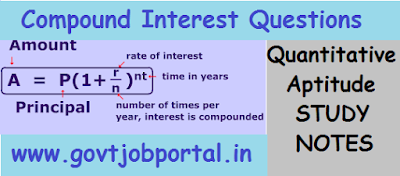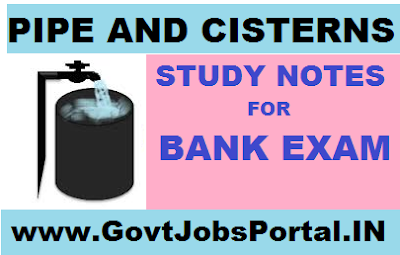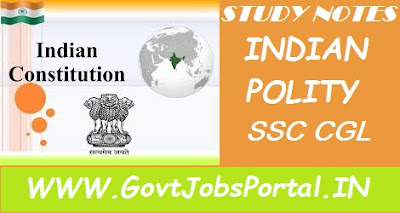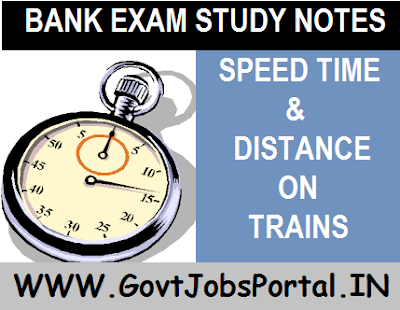GENERAL AWARENESS
STATIC GK FOR SSC CGL
INDIAN POLITY
General
Awareness is a source
for good preparation of Bank, SSC CGL, UPSC, and railway and for other
competitive exams. Study General Awareness from www.GovtJobsPortal.in and stay updated
as well as prepare for General Awareness section which is asked in SSC CGL, UPSC
and other competitive exams. As continuously we are providing static GK study
notes for SSC CGL on various topics. Today we are providing study notes on ‘INDIAN
POLITY’. Indian polity is one of the most important topics for general
awareness section in the competitive exam. From this topic maximum 10-12
questions are given in the SSC CGL exam.
In our recent topic we have covered
the Indian constitution preamble and borrowed features. So as continuing INDIAN
CONSTITUTION, today we are providing the Parts of the Constitution and its
Articles as well. In the constitution at present there are 448 articles in 25
parts, 12 schedules, 5 appendices and 98 amendments. But at the time of commencement there was only
395 articles in 22 parts and 8 schedules.
PARTS
OF THE CONSTITUTION
PART – I (Article 1 – 4)
Deals with territory of India
formation of new States, alterations, names of existing states.
PART – II (Article 5 – 11)
Deals with various rights of
citizenship.
PART – III (Article 12 – 35)
Deals with fundamental rights of
Indian citizens.
(Article 31 – dealing with the
right to property was deleted by 44th amendment).
PART – IV (Article 36 – 51)
Deals with Directive Principles
of State Policy.
PART – IV – A (Article 51A)
Added by 42nd
amendment in 1976. Contains the duties of the citizens.
PART – V (Article 52 – 151)
Deals with govt. at the Union
Level.
(Duties and function of PM,
Ministers, President, Attorney General, Parliament – Lok Sabha and Rajya Sabha,
Comptroller and Auditor General).
PART – VI (Article 152 – 237)
Deals with govt. at State Level.
(article – 152 exempts J & K
from the category of ordinary states).
(duties & functions of Chief
Minister & his ministers, Governor, State legislature, High Court, Advocate
General of the state).
PART – VII (Article 238)
Deals with States, was replaced in 1956 by the 7th
amendment.
PART – VIII (Article 239 – 241)
Deals with Union Territories.
PART – IX
Consists of 2 parts:
Added by 73rd
amendment in 1992. Contains a new schedule ‘SCHEDULE ELEVEN’. It conatains 29
subjects to Panchayati Raj. (They have been administrative powers).
Added by 74th
amendment in 1992. Contains a new schedule ‘SCHEDULE TWELVE’. It contains 18
subjects related to Municipalities. (They have been given administrative
powers).
PART – X (Article 244, 244A)
Deals with Scheduled & Tribal
Areas.
PART – XI (Article 245 – 263)
Deals with relation between Union
and States.
PART – XII (Article 264 – 300A)
Deals with distribution of revenue
between Union and States, appointment of Finance Commission (Article 280),
contracts, liabilities etc.
PART – XIII (Article 301 – 307)
Relates to trade, commerce and
intercourse within the Territory of India.
PART – XIV (Article 308 – 323)
Deals with UPSC and Public
Service Commissions.
PART – XIV – A (Article 323A,
323B)
Added by 42nd
amendment in 1976. Deals with administrative tribunals set by Parliament to
hear disputes and complaints regarding Union, States or Local govt. employees.
PART – XV (Article 324 – 329)
Deals with elections (Also
Election Commission).
PART – XVI (Article 330 – 342)
Deals with special provisions for
Scheduled Castes and Scheduled Tribes and Anglo – Indian Representation.
PART – XVII (Article 343 – 351)
Relates to official language.
PART – XVIII (Article 352 – 360)
Deals with emergency pro-visions.
PART – XIX (Article 361 – 367)
Exemption of criminal proceedings
for their official acts of President and Governors.
PART – XX (Article 368)
Deals with Amendment of
Constitution.
PART – XXI (Article 369 – 392)
Article - 369 gives temporary
powers to the Parliament to make laws for State list.
Article – 370 contains temporary
provisions of J & k – Restricts the parliament to make laws for that state.
Article – 371A, 371B, 371C, 371D,
371E, 371F, 371G, 371H & 371-I relates to special provisions for
Maharashtra, Nagaland, Assam, Manipur, Andhra, Sikkim, Mizoram, Arunachal &
Goa.
PART – XXII (Article 393 – 395)
Concerns the short title,
commencement and repeal of the Constitution.
To view Static GK study
notes on other topics CLICK HERE




















